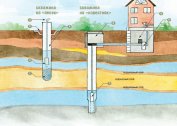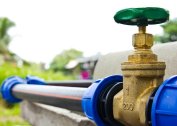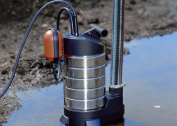Water is the country's wealth, so no one can use it for free, especially if it is supplied through the water supply network. Therefore, a contract for the supply of water and its disposal through sewer systems should be concluded between the consumer and the water utility. For this, standard contracts are used, which are approved by the decree of the Government of the Russian Federation under the number 645 of 07.29.2013. Contracts for cold water supply and sanitation with a legal entity or individual are concluded after the subscriber submits documents for the ownership of real estate or land. An application is submitted to the water supply organization, where it will be considered within 20 days.
List of attached documents
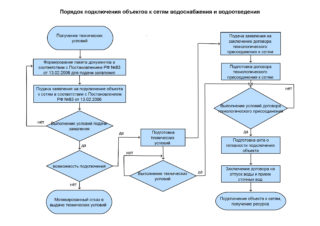 In addition to a certificate for real estate or land, other documents must be attached to the application:
In addition to a certificate for real estate or land, other documents must be attached to the application:
- Lease agreement or document proving ownership of the operational management of the lease.
- If the subscriber does not have the right to connect to centralized networks, an act of delineation of responsibility (operational) with the owner of the pipe section connected to the central water supply will be required.
- For individuals, a photocopy of the passport is required. For legal - a document that confirms the authority of the person signing the contract. This is usually a power of attorney.
If you want to connect to the cold water supply and sanitation of newly constructed facilities, you must additionally attach to the application:
- technical conditions of connection, which are fixed in the design of the building or structure under construction;
- a certificate that confirms that the work on connecting to centralized networks was carried out strictly according to the technical conditions and design estimates.
If it is necessary to carry out water supply and sewage to non-residential buildings, then one more document is added - a certificate stating that the buildings are not connected to the centralized water and sewer networks.
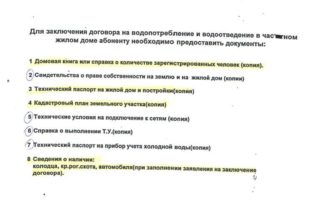 In addition to all of the above documents, the application must be accompanied by:
In addition to all of the above documents, the application must be accompanied by:
- Copies of passports for water meters water metering and sewage.
- The project of installation of accounting devices.
- A diagram that indicates where the meters, sections, or sampling points for sewage and tap water will be installed.
- Layout plan for all metering devices and connection points to centralized networks.
- The balance of water consumption. This is a design value based on the number and types of consumers (plumbing fixtures). If the connection will be made to the technological line for the production of some products, the passport data of the equipment with an exact indication of the volume of consumption is entered into the balance.
A subscriber who has received a cold water supply and sanitation contract must sign it within 30 days. He must give one copy to the organization dealing with water supply and sewage. This day will be the beginning of the entry into force of the contract.
If during the indicated period the subscriber did not provide one copy of the contract, that is, he does not agree with the conditions for receiving water and discharging sewage, the water supply and sewer organization must agree with the subscriber on the terms of the model contract or submit other contracts. This can be a separate contract for cold water supply, for sewage or a single contract for the delivery of water and the discharge of sewage. The same claims can be brought by the subscriber to the sample of a single standard contract for cold water supply and sanitation.
The consumer is given 10 days to sign a new contract. If he signs it, one copy must be returned to the plumbing company.
If, after agreeing on the clauses of the first contract and settling all disputed issues, the water utility has not sent the consumer a new version of the contract document within 10 days, the latter can go to court.
Terms of an agreement
Water supply conditions
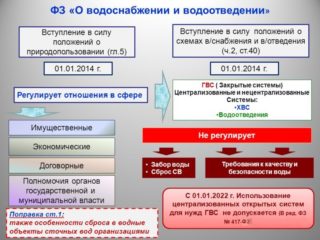 The main conditions of the water supply agreement are:
The main conditions of the water supply agreement are:
- Delivery mode: guaranteed volume of water, pressure inside the water supply system, technological connection. It necessarily takes into account not only the drinking water and industrial water supply, but also the fire extinguishing system.
- Dates for guaranteed water supply.
- The quality of industrial and drinking water.
- The procedure for quality control.
- Conditions for reducing pressure / volume or complete cessation of supply.
- By what means it will be necessary to consider the expense.
- In what order and in what terms will payment for the consumed liquid be made.
- How and in what time frame a report will be submitted for the liquid used. This applies to subscribers.
- Differentiation of responsibility of the consumer and the water and sewer company. Typically, such a boundary passes at the junction of the centralized water supply system to the supply circuit going to the owner’s property.
- Rights and obligations of two parties.
- Responsibility of the two parties if the terms of the contract are not respected.
- Dispute Resolution Procedure.
- Conditions for admitting representatives of the water supply and sewer organization to the places of installation of water meters and metering points.
- Conditions under which water is supplied to other consumers connected to the main network of the subscriber.
Another important condition is payment and tariffs. One calendar month is a reporting period. Billing is carried out separately: for drinking water or technical, or for the entire volume of fluid consumed. Tariffs are set in accordance with the provisions of the Federal Law entitled “On Water Supply and Sanitation”. Often billing is carried out according to other regulatory acts.
Water disposal conditions
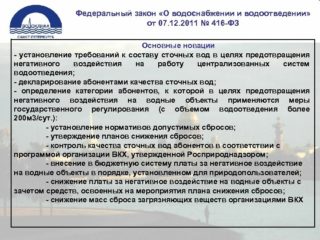 The responsibilities of the organization carrying out water disposal include the reception of sewage, their transportation, treatment and discharge into an open reservoir. The subscriber undertakes, according to the contract, in which a special clause is established, to strictly monitor the composition of discharged effluents. This moment is fixed in the Federal Law on the environment.
The responsibilities of the organization carrying out water disposal include the reception of sewage, their transportation, treatment and discharge into an open reservoir. The subscriber undertakes, according to the contract, in which a special clause is established, to strictly monitor the composition of discharged effluents. This moment is fixed in the Federal Law on the environment.
The main conditions for receiving wastewater are:
- mode of discharge (reception) of effluents;
- by what methods and means accounting is performed;
- under what conditions can the reception be limited or the discharge completely stopped;
- sampling sites;
- conditions of access to places of registration and sampling;
- the procedure for controlling the composition of discharged effluents.
The remaining conditions are fully consistent with the cold water supply agreement. Violation of contract clauses is independently regulated by the parties. If the parties have not come to a consensus, the case of one of the parties may be referred to court.
